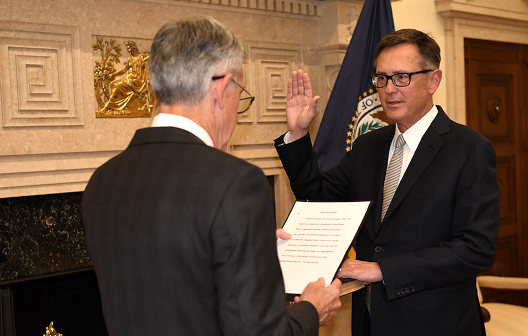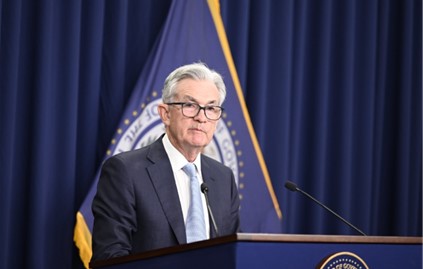Image Credit: Senator Stabenow (Flickr)
Who will Regulate Cryptocurrencies? The Senate May Have a Favorite
One ongoing cloud over cryptocurrency exchanges, crypto creators, and even the NFT market is the uncertainty of future regulations. Regulation, while seen as restrictive, would also mean acceptance of the asset class. Acceptance coupled with a more certain playing field would benefit all stakeholders, from the crypto investor to the business that allows purchases in crypto, all the way through to the blockchain companies that are necessary for its digital existence.
SEC vs CFTC
Crypto interests have had a favorite among two potential oversight bodies, the Securities and Exchange Commission (SEC), versus the Commodities Futures Trading Commission (CFTC). And the stakeholders have been vocal to lawmakers in Washington as to the preference.
The SEC Chair Gary Gensler once taught cryptocurrency at MIT, a top school helping to design and study the future of crypto. However, this is not the regulator most crypto interests would prefer. Instead, they prefer oversight from the CFTC. The CFTC Chairman Rostin Behnam is advocating his agency provide the biggest role in cryptocurrency regulation. In a speech last month, he said federal and state regulators sharing responsibility in a “patchwork blanket” approach “is increasingly proving inadequate” as the crypto market rapidly evolves. Lawmakers in the Senate must have been listening.
Senate Crypto Bill
Under a new bipartisan bill from Sens. Debbie Stabenow (Mich) and John Boozman (Ark), the CFTC would take the lead role in overseeing the two largest cryptocurrencies and the platforms where they are traded under the bill. Oversight of the remaining cryptocurrencies would be divided between the CFTC and the SEC – the methodology to be used in determining who has higher jurisdiction is not yet fully specified.
The two agencies have been positioning for more authority over digital assets. As the assets are still very new to the world, there has certainly been confusion in Washington over how to classify and regulate cryptocurrencies and its digital ecosystem. While lawmakers looked to the regulators for guidance, in the end, the official determination is the responsibility of lawmakers. The major goal of the Stabenow/Boozman bill is to provide some clarity by deeming as commodities both bitcoin (BTC.X) and ethereum (ETH.X), which account for roughly two-thirds of the cryptocurrency outstanding.
If passed by the Senate and House and signed into law, both bitcoin and ethereum would primarily fall under the CFTC, which already oversees futures markets for both. Online platforms that allow investors to trade the coins, such as Coinbase (COIN), would be required to register with the agency.
Two other members of the panel, Sens. Cory Booker (D-N.J.) and John Thune (R-S.D.), are co-sponsoring the measure. Stabenow, said the committee could mark up the bill as soon as September.
The bill comes after another introduced by Sens. Cynthia M. Lummis (Wyo) and Kirsten Gillibrand (N.Y.) in June unveiled what they announced as a comprehensive plan to regulate the industry. Their proposal outlines primary responsibility for the industry to the CFTC, but unlike the bill from Stabenow and Boozman, it would make it optional for crypto exchanges to register with the agency.
Related News
This week Gary Gensler who Chairs the SEC, is facing massive criticism after being accused of being complicit in criminal activities “perpetuated by Citadel Securities & Citadel Market Maker. He is being accused of “obstruction of justice due to his lack of enforcement of the laws pertaining to naked short selling and lack of competent oversight of the market makers activities,” according to the petitions home page. The petition also demands, “Mr. Gensler needs to step down as the chairman, and a thorough, detailed, forensic analysis and investigation into Citadel Securities and Citadel Market Maker. This cannot go unpunished.”
Take Away
Both Senate bills would allow the CFTC to assess fees on crypto industry players to fund an expanded agency budget. The agency, roughly a sixth the size of the SEC, is already tasked with overseeing a section of financial markets, from grain and oil futures to more complex products.
The SEC has been seen as regulating without proper authority. Agencies can not overstep the powers granted to them by Congress. Members of the Senate, to their credit, have been looking to determine how best to develop oversight between these two agencies and the others that are also impacted.
Managing Editor, Channelchek
Suggested Content
 SEC Nearly Doubles Size of Enforcement’s Crypto Assets and Cyber Unit
|
 New Measures to Limit Government Officials Trading
|
 SEC Pokes Fun at Investors, Draws Controversy
|
 Powell’s Economic Soft Landing Requires More Room to Change his Mind
|
Sources
https://www.cryptotimes.io/sec-chair-gary-gensler-accused-in-citadel-market-maker-manipulation/
Stay up to date. Follow us:

|
